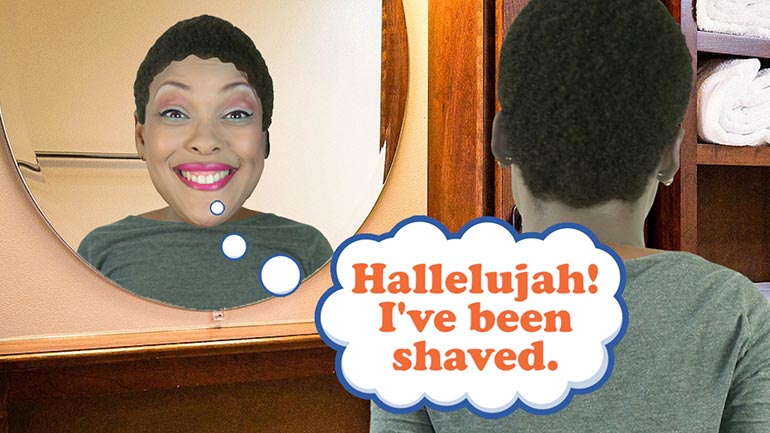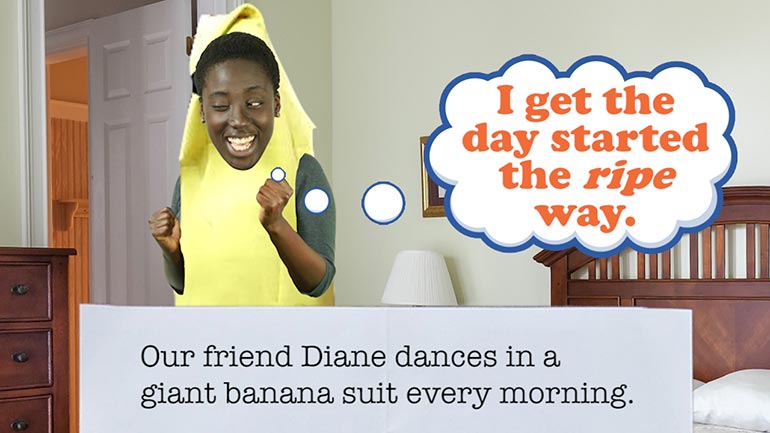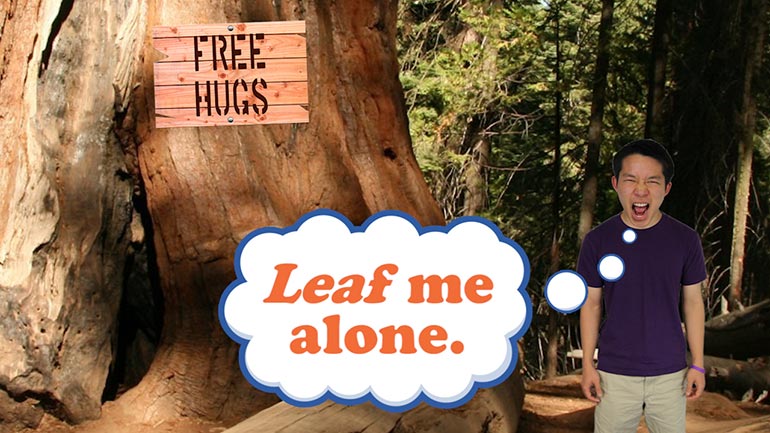ShmoopTube
Where Monty Python meets your 10th grade teacher.
Search Thousands of Shmoop Videos
Social Studies 4: Informative Writing and Organized Research 191 Views
Share It!
Description:
Informative writing is all about sharing information in an easy-to-understand way, and it requires a precise organization of research to be successful. But with good preparation and planning, you'll be informing the heck out of your audience in no time.
Transcript
- 00:03
[Dino and Coop singing]
- 00:12
How do you make the number one disappear?
- 00:15
Add a G and it's “gone.” [The letter G is added to the front of 'one']
- 00:18
What's the easiest way to double your money?
- 00:20
Hold it in front of a mirror. [An arm holds a dollar bill up in front of a mirror]
Full Transcript
- 00:22
What has to be broken before you can use it?
- 00:25
An egg.
- 00:26
All of these are riddles – and while they do make you think, their ultimate job is really
- 00:31
to just flat-out confuse you. [A man and a woman looking confused]
- 00:32
In other words, they're the complete opposite of informative writing.
- 00:36
Informative writing is all about sharing information in an easy-to-understand way, and require [Coop pointing at a blackboard]
- 00:41
the organization of research to be successful.
- 00:44
But with good preparation and planning you'll
- 00:46
be informing the heck out of your audience in no time." [Boy on stage]
- 00:49
For starters, you'll want to make sure your paragraphs begin with strong topic sentences. [Large men wearing a 'topic sentence' vest towers over a crowd of people labelled 'paragraphs']
- 00:54
Any good topic sentence will clearly outline or identify two things: [Dino pointing at a blackboard]
- 00:57
The subject of the writing and the main idea of the writing.
- 01:00
Now you might be thinking the “subject” and the “main idea” sound like the same thing. [Boy looking confused]
- 01:05
But there's a slight difference.
- 01:07
The subject is simply the topic that your writing is focusing on. [Coop pointing at a blackboard]
- 01:10
So if you were writing an essay about the geography of Alaska, Hawaii and Washington
- 01:15
DC, then that would be your subject. [Pictures of the places appear]
- 01:17
Meanwhile, the “main idea” is what you want your readers to actually learn about [Dino pointing at a blackboard]
- 01:21
your subject.
- 01:22
So if we were to ask ourselves, “what do we want the readers to remember about the [Boy writing notes in class]
- 01:25
geography of Alaska, Hawaii and Washington DC?”
- 01:27
Our main idea might be we want our readers to remember the differences between the
- 01:31
geographic elements of those three places.
- 01:33
So that no one accidentally sets up a dog sleigh team in Hawaii [Woman dressed in a winter coat riding a dog sleigh down the beach]
- 01:37
A very strong topic sentence that includes both the subject [Strong man holding up weights labelled, subject and main idea]
- 01:40
and main idea might be:
- 01:42
“The distinct differences between Alaska, Hawaii and Washington, DC can be highlighted [The topic setence being written out]
- 01:47
by comparing their different geographic elements.”
- 01:49
By identifying our subject and our main idea, the process of writing our topic sentence [Police line up with two people wearing subject and main idea shirts]
- 01:53
becomes so much easier.
- 01:55
Once you've nailed your topic sentence down, the next step is to fill that paragraph to the brim [Boy typing on his laptop]
- 02:00
with details.
- 02:01
Always remember that every single sentence in a paragraph should support your topic sentence. [Coop pointing at a blackboard]
- 02:05
The topic sentence states your entire focus, so you never want to lose track of it.
- 02:10
Or go off on some meaningless tangent.
- 02:13
Which by the way, have you noticed that the Cherry Blossoms are in bloom, aren't they lovely.. [Girl looking at a Cherry Blossom tree]
- 02:17
In the case of our paragraph comparing Alaska, Hawaii and Washington DC, we might include
- 02:22
details about those places' climate, population, industry, or any other geographic elements [Guy surfing a big wave]
- 02:27
that we might want to compare.
- 02:29
Once you've hammered out all your details, it's time for your closing sentence. [Blacksmith hammering molten metal]
- 02:32
A good closing sentence restates your topic sentence in a new way, while also giving the [Dino pointing at a blackboard]
- 02:37
reader something to think about.
- 02:39
Once you're done the core writing, all that's left is to consider using some snazzy text [Three guys dressed in shiny suits]
- 02:43
features to spice it up a bit.
- 02:44
Got a cool title to catch the readers' eye?
- 02:47
Use it.
- 02:48
Think you could use some subheadings to better organize the information?
- 02:51
Go for it.
- 02:52
Have a photo, illustration or chart that helps to illustrate your point? [Picture of a dog and a cat lying together]
- 02:54
Add it in.
- 02:55
Just be sure that if you're going to add a photo, that it actually makes sense and adds [Man looking at a picture on Washington on his laptop]
- 02:59
to your writing.
- 03:00
A photo of Washington's landscape used to highlight the geography there?
- 03:04
Awesome.
- 03:05
A photo of the hotdog you ate on a class trip to Washington last year? [Picture of a giant hot dog]
- 03:08
Maybe not so helpful.
Up Next
Sticks and stones, right? Well...only sometimes. It's a good idea to make sure your words aren't going to hurt others. Let's look at some ways to d...
Related Videos
Learn to debate like a champ. It's way better than debating like a chimp. That just takes mudslinging to a whole new level.
Today we'll learn about biographies and autobiographies. And no, the second one has nothing to do with the lives of cars.
In this lesson we'll subject you to some verbs and predicates. Each one is a necessary part of a complete breakfas—er...sentence.
Choosing words carefully is important. You may end up vexing the assemblage of citizens you're conversing with...or you might even just plain bore...




